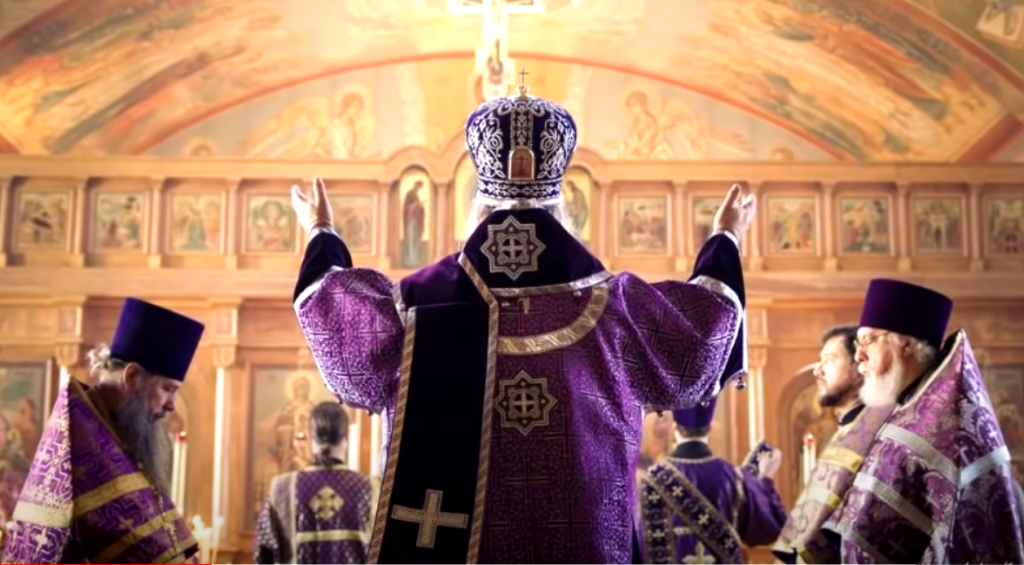
by Fr. Jonathan Cholcher
“For this cause I was born, and for this cause I have come into the world, that I should bear witness to the truth. Everyone who is of the truth hears My voice.” (John 18:37)
To this statement made by our Lord Jesus to the Roman procurator Pontius Pilate, Pilate responded with a question, “What is truth?” Pilate was expressing a notion common among people of this world, namely, that truth is a thing, an abstract idea, to be manipulated and used according to one’s imagination, not something solid or absolute. Today we find such a plastic notion of truth on full display in the redefinition of fundamental concepts formerly taken as self-evident: marriage and gender, just to name a couple. Sadly, the notion of Christianity has been subjectivized to such a degree to be unrecognizable in doctrine and practice when different groups claiming to be Christian are compared and contrasted.
The Elder Sophrony (Sakharov; d. 1993) points out Pilate’s folly. The question is not “what” is truth, but Who. Truth is not a “thing”; He is a Person, the Son of God Himself in the flesh standing before the procurator, in full display before the chief priests, the scribes, and the people. The Person who is Truth is concrete, tangible, observable, and not subject to re-imagination or re-definition. He is who He is, both God and Man.
We read in the Gospel that “a crowd of His disciples and a great multitude of people from all Judea and Jerusalem, and from the seacoast of Tyre and Sidon came to hear [Jesus] and be healed of their diseases, as well as those who were tormented with unclean spirits. And they were healed. And the whole multitude sought to touch Him, for power went out from Him and healed them all” (Lk. 6:17-19). Jesus the Savior is real. His teaching is real, and His power to heal is real. He is the truth, which is why so many people gathered around Jesus.
This same Truth is operative today in the Orthodox Church; in fact, this Truth who is Jesus the God-Man is the appeal of Orthodoxy not only today, but throughout the history of the Church. After the apostle Simon bar-Jonah’s confession of Christ: “You are the Christ, the Son of the living God” (Matt. 16:16), Jesus said, “You are Peter (Gk., petros [stone]), and on this rock (Gk., petra [boulder], that is, Petros’s confession) I will build My church, and the gates of Hades shall not prevail against it” (Matt. 16:18). The night before His crucifixion Jesus said, “I am the way, the truth, and the life. No one comes to the Father except through Me” (Jn. 14:6). And the apostle Paul reminds us: “Jesus Christ is the same yesterday, today, and forever” (Heb. 13:8).
Because Christ Jesus is a real Person, His Body the Church (of which He is the Head) is real, witnessing the same Truth of Christ wherever this Church is gathered throughout the world in every age. Simply by gathering in faith and love to share in the liturgy (Gk., leitourgia; Heb. 8:6) of Christ, the Church enacts its basic calling, to bear witness to the truth found only in the Person of the Truth, Jesus Christ, the High Priest and Liturgist (Gk., leitourgos; Heb. 8:2). From this Divine Liturgy in which Jesus Christ gives Himself, His very Body and Blood, the same grace and power of the Holy Spirit by which Christ is incarnated (lit., “enfleshed”) among the faithful are truly present to enlighten the darkness of ignorance and heal the wounds of sin.
Many are attracted to Orthodoxy for its ethnic or exotic characteristics. Contrary to its own unique nature, many within the Orthodox Church itself have actively or passively perpetuated the stereotype that it is the place to enjoy such things par excellence: ethnic foods and dances; Greek, Slavonic, and Arabic languages; incense and icons, bells and candles; all wrapped up as “traditional” and “changeless.” The appeal is to come and view a living museum, a window to something accessible on display, but ultimately remote from everyday life.
Yet people are ultimately hungry for the truth that gives meaning to their everyday life, because that’s the real life we lead. Created in the image and likeness of God (Gen. 1:26-27), human persons are built to seek and know the truth. Even now with sin, corruption, and death in the world, people not only want but need the truth to survive and pursue a healthy and productive life according to God’s design. This is the true appeal of Orthodoxy because it has the Truth in Jesus Christ. The proof of this Truth is precisely the fact that concerning doctrine and practice exemplified in its worship of God, the Orthodox Church has not, nor ever will, change, despite the outward trappings of the customs of the peoples God integrates into its new life in Christ.
“I write so that you may know how you ought to conduct yourself in the house of God, which is the church of the living God, the pillar and ground of the truth” (1 Tim. 3:15). To the Corinthians, the apostle writes: “And my speech and my preaching were not with persuasive words of human wisdom, but in demonstration of the Spirit and of power, that your faith should not be in the wisdom of men but in the power of God” (1 Cor. 2:4-5).
The appeal of Orthodoxy is the actual power to save, that is, to know the truth and to walk in it for our own eternal well-being to the glory of God.
